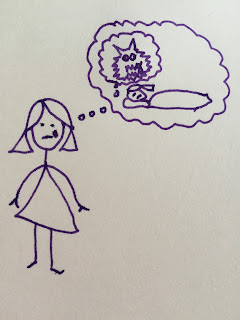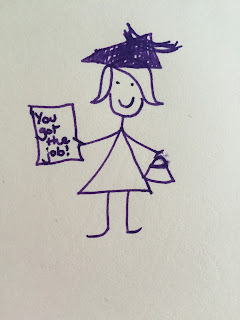I am so pleased to welcome +Claire
Robinson-Ayres (BrizzleLass) to my blog for the first ever guest
post!
Claire writes about her
experiences working alongside life-long mental illness, with an eventual diagnosis
of bipolar. When I read this I am reminded of how strong, resourceful and
creative many sufferers of mental illness are. Even though her health makes
working extremely hard, Claire still holds on to her ambition and drive. Thank
you Claire, for this inspiring story. +BrizzleLass
Blog
I first started showing signs of problems with my mental health as a young child, when I was diagnosed with depression and emotional instability at just nine years old. Being part of the mental health system was nothing new to me, and if anything it made me all the more determined to be 'normal' and to show everyone I could be successful and I did, to the detriment of my mental health.
I was diagnosed with bipolar disorder when I was 25, by which time I had forged a career in marketing within professional services, most prominently in the legal sector. I worked hard at my career while juggling my illness for several years. In the end I left professional services as it was far too stressful and worked part time in online marketing; but even that wasn't enough to stop my illness taking over, especially when a mystery physical problem appeared which took a few years for doctors to diagnose and resolve.
I was forced out of my job in 2013
After being forced out of my job in 2013 I decided to set up as self-employed and start managing my workload more effectively. I had some great contacts from my 15 years of experience. I started contacting people, and the work slowly started coming in. I managed to get enough work to keep me busy 2-3 days a week, which was just what I had hoped for.
I had a great rapport with my clients and they appreciated having someone who understood social media algorithms and could put together plans to utilise their marketing budgets effectively. I spent my time writing social media posts, blogs, rewriting blog content, sorting out SEO, and generally doing the kind of marketing I really enjoy. I made my clients happy, made them money and all was good.
Then hypomania started, I went from working 2-3 days a week to working 18-20 hours a day, seven days a week. Now for a start I didn't have near enough work for this, but I managed to do it anyway, I would sit at my kitchen table, bent over my laptop working like my life depended on it, I would just be typing away, correcting things, rewriting posts, pages, changing spreadsheets, reformatting invoices. You name it I found it to do.
This spectacular demonstration of hypomanic obsession went on for four months, at which time I crashed into the deepest depression I've ever been in. In my entire life, through all the depressions I've ever known nothing has been like this. In the space of a week my business folded and I was bankrupt.
As if that wasn't bad enough I tried to take my life for the first of six times that year, I was at the beginning of what was to become the year from hell and it was only April! Later I joked that at least I lined my breakdown up with the financial year for HMRC!
I went from always being the person who worked, and found a way through to having no job, no business, no savings, no money. For the first time in my life I had to turn to DWP; it was the most humiliating process of my life (and bankruptcy was very humiliating)! I've been on these benefits just over a year now and to this day I hate them, I feel sad that my life reached a point where I became that sick.
I work really hard with the team that helps with my mental health care, and I have a clear goal of being able to work again in the future. But I also need to reach a point where I am stable. This is something I have never been and it is an issue my mental health team are helping me deal with. Between medication and therapy we will get there.
I'm not good at doing the 'sick' thing though. I can't just fill my days with nothingness. I'm a born worker-bee. So I started blogging again. I now write about mental health, I'm trying to be an advocate, to speak out and encourage others to. The more people speak of their experiences honestly the less 'hidden' it will be.
I also review books: reading gives my mind peace; it calms the 'voices' I hear and regardless of whether I'm depressed or manic I get some time out. Writing is also very therapeutic to me so finding different ways to write has helped immensely.
"I also review books: reading gives my mind peace"
I have a daily to-do list, which contains all the daily basics for when I'm depressed and struggle to even get out of bed, so an achievement will be ticking off things such as: shower, eat breakfast, make lunch, clean teeth, go outside. On more normal days, the idea is to do more interesting things on the list like writing, or walking, making sure housework is done. When I'm hypomanic I need to make sure I don't go overboard and so must do no more than is on that list. For example, I have a tendency to go out for a short walk and come home 5 hours later so I will set a timer and that will tell me to turn and go home regardless of how much I want to continue!
My life hasn't quite turned out how I planned: I thought I would be a company director by now. But that wasn't meant to be. Instead I've discovered I'm immensely creative. Words come to me when I start writing and I'm using that gift to raise awareness. I will go back to work but what I will do exactly I don't know.
I do know that I won't let Bipolar beat me!
Please do come and follow me at my blog BrizzleLass.co.uk, on Twitter @BrizzleLass, or on Facebook see BrizzleLass Blog.
























